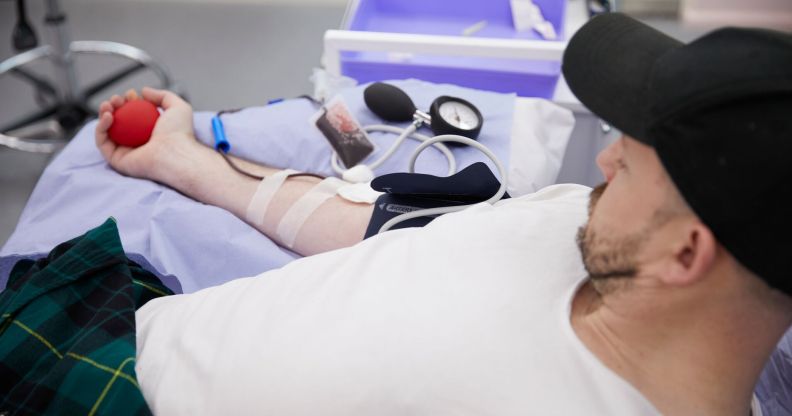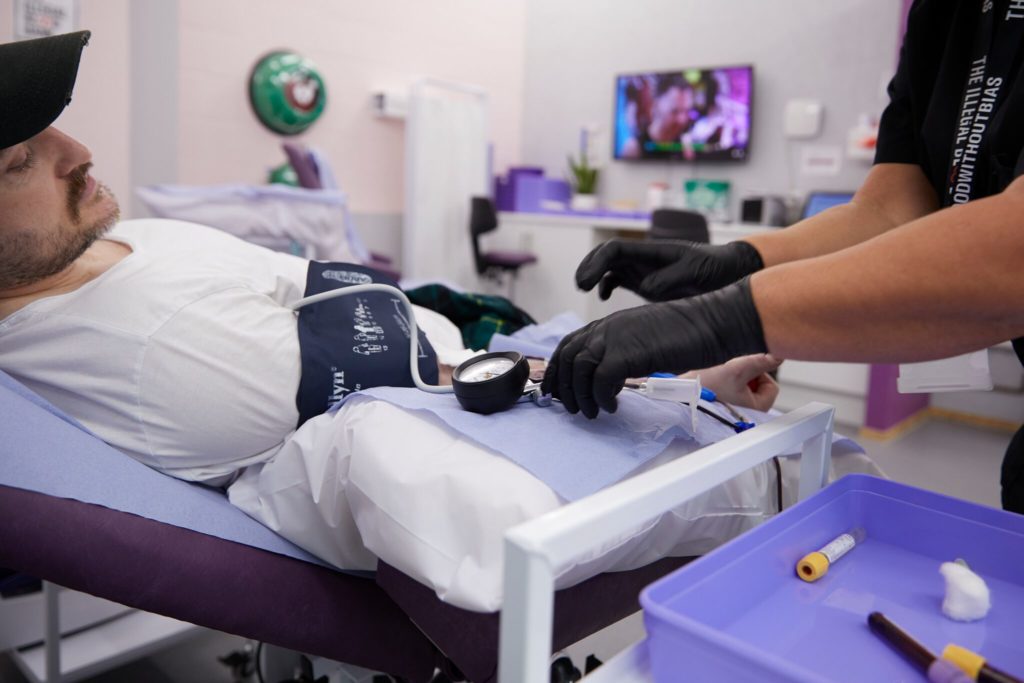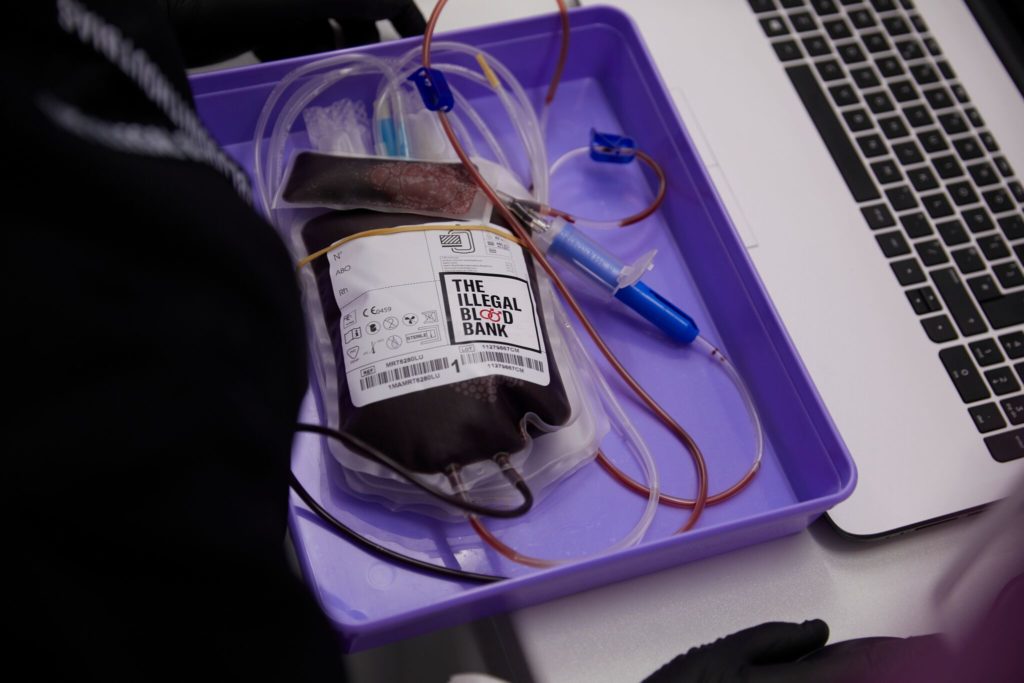An ‘illegal blood bank’ for queer men was launched in the UK in backlash against backwards laws

A queer man donates blood at the ‘illegal blood bank’, set up by activists to highlight backwards laws. (UNILAD)
Somewhere in a secret location in England’s capital city, an ‘illegal blood bank’ billed specifically for queer men was launched in a damning act of defiance against backwards blood donation laws.
Men who have sex with men are prohibited from donating blood unless they are willing to abstain from sex for three months in Britain.
But LadBible’s UNILAD, in partnership with ELVIS and pressure group FreedomToDonate, opened the discreet blood drive in London yesterday.
It offered queer men the opportunity to donate blood to highlight the discriminatory law, with gay rugby player Keegan Hirst being one of them.
Organisers said that the blood bank was at capacity and 26 pints of blood were taken in one day alone to protest the policy.
Moreover, 2,300 men who have sex with men pledged digital pints to show that, if they could, they would donate.
Gay blood ban continues despite plunging donation rates.
The National Health Service has seen a 25 percent drop in men donating blood since 2014 and requires 135,000 new donors each year to maintain blood levels.
Blood stocks also tend to fall between December and January according to statistics.

A medic preps a queer man to donate blood. (UNILAD)
Campaigners have called for the three-month deferral period set by the Government to be lifted, saying this policy is unnecessary, discriminatory and a waste of safe blood.
Moreover, donations should be considered on an individual basis, critics said, slamming current deferral times as serving to ferment prejudice against those living with HIV as well as the wider queer community.
Many campaigners have also flagged the ‘window period’ of donated blood, where simple tests can swiftly identify whether blood contains the virus.
The Government set the three month deferral based on advice from a Department of Health and Social Care expert committee called the Advisory Committee on the Safety of Blood, Tissues and Organs.
Currently the blood services of England, Scotland and Wales have implemented these guidelines.
‘Breaking the law’: Gay and bisexual blood donators protest the ban.
Qualified medical professionals were at hand at the “illegal blood bank” to assist those who registered for the initiative.
Dozens came out of the branch carrying ‘Future Donor’ cards and small marks on their arms, with many taking to Twitter to praise the initiative and protest donation policy.
Was the 1st donor this morning for #BloodWithoutBias @FreedomToDonate
It’s ridiculous that gay & bisexual men are still not able to donate. I have a rare blood type & totally willing to give blood on a regular basis! pic.twitter.com/SI7Cm1LRDR
— MJ (@mattmusic78) November 23, 2019
Matt was first in line yesterday. He told PinkNews that he got involved in the initiative, “because I believe that blood donation policy should be based on up-to-date scientific evidence.
“I have a rare blood group and am more than willing to donate every few months.”
Breaking the law #bloodwithoutbias pic.twitter.com/zFmicW3nhQ— Matt Garforth (@MattGarforth) November 23, 2019
My #bloodwithoutbias donation is done and I'm a pint lighter! #thankyou @FreedomToDonate, and to @UNILAD who have really supported the campaign to end the @GiveBloodNHS gay men discrimination. pic.twitter.com/IzXMhKRlz0— Damian Chapman (@damianchapmanuk) November 23, 2019
Organisers: ‘Anyone who can safely donate blood should be able to.’
Ethan Spibey, founder of FreedomToDonate, said: “Our position is simple – anyone who can safely donate blood should be able to.
“Through our collaboration with UNILAD, we’re aiming to raise awareness of the unfairness in blood donation on a huge scale and demonstrate the incredible potential of those thousands of gay and bi men who could potentially donate through an alternative model.”
Hirst, an ambassador for the campaign, said: “There are still very few professional sportsmen and women who are openly gay.
“People should be empowered to celebrate who they are but this won’t happen if there are policies in place, which discriminate against certain communities.
“ I’m donating blood at the Illegal Blood Bank in the hope it leads to gay and bisexual men who are safe to donate, being able to do so.”
In response to the initiative, Doctor Su Brailsford of NHS Blood and Transplant said: “We’re already working collaboratively with LGBT+ groups on blood donation, through the FAIR steering group.

A pint of donated blood from the bank. (UNILAD)
“This group is using an evidence-based approach to explore if a more individualised blood donation risk assessment can be safely and practically introduced, while ensuring the safe supply of blood to patients.
“We want to give as many people as possible the opportunity to donate whilst continuing to ensure the safety of patients remains our number one priority.”
While the blood bank has since shuttered its doors for the one-day promotion, activists and organisers are calling on the public to help to create a culture of blood without bias by signing their petition.
Around 60,000 have already done so.

